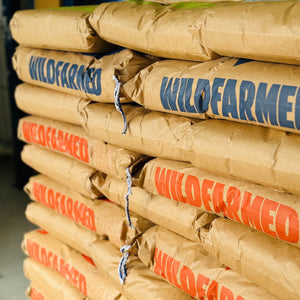
Baking & Flour Glossary, Baking Terms & Meanings.
All Purpose Flour
All Purpose Flour is a versatile, general-use flour, usually milled from a hard wheat or a ratio of hard and soft wheat. It can be used for making many types of baked goods, such as bread, biscuits, pizza, cookies, muffins. All Purpose Flour is the US equivalent of Plain Flour in the UK.
Endosperm
The largest portion of a grain kernel formed of protein and carbohydrates, but only small quantities of vitamins and minerals. For many types of grain products, the endosperm is the only part of the grain that is used.
Granary
Granary is a registered trade name of Rank Hovis Ltd. It is used to describe their malted wheat grain flour, which contains malted wheat flour that gives the flour a characteristic texture.
Durum
Durum or Semolina wheat, is a hard wheat milled specifically for making pasta. During the milling process, some of the starch content is damaged and durum wheat lacks the D-genome, as a result it produces a dough with high extensibility.
Crumb
Crumb refers to the size and pattern of the holes in a loaf of bread.
Spelt
Spelt is a fine, smooth ancient grain flour, which can be substituted for an all-purpose flour. It is lightweight so produces a good rise, with a distinctive flavour.
Rye
Rye is a heavy, ancient grain, packed with core vitamins and minerals. It creates a dense dough, with a lower gluten content than more commonly used bread flours.
Germ
Wheat germ is the embryo of the wheat kernel. It has high nutritional value and a distinctive nutty flavour and crunchy texture.
Rollermilled
Rollermilled refers to the method by which the flour is milled. It is a process used to separate the anatomical parts of grain kernels—like the bran, aleurone layers, germ and endosperm—and grind them down into fine flour particles. Instead of the traditional flat millstones, the flour is milled using 2 parallel cylinders. The flour passes through the rollers more quickly and the process is generally considered to be more efficient.
Stoneground milled
The traditional method by which flour is milled, using 2 round, flat millstones. The flour is in contact with the stone for much longer than by roller milling. As a result, more of the germ and bran is in the final product, creating a heavier flour with a stronger flavour.
Sourdough Starter
A fermented dough which acts as a culture to grow yeast and a bacteria called lactobacilli. It is used as a raising agent in sourdough bread.
Ear
In baking, the term ear refers to the ridge in a crust created by scoring the loaf just before baking. It usually stands proud of the loaf and is darker in colour than the rest of the crust.
Fermentation
Fermentation is the chemical breakdown of substances by yeast and other bacteria, typically producing effervescence and some heat. In baking, this process is relied on to create rise in bread, as the effervescence creates bubbles which expand during baking.
Hydration
Hydration is defined by the total amount of water to flour. Hydration changes the properties of the dough, with a lower hydration creating a stiffer baked good.
Knead
To work the dough to create a smooth and cohesive mixture, developing the gluten structure. It can be done by hand or mechanically.
Proof
Proof refers to the second rise, once the dough has been shaped into the loaf. It allows the yeast to release the CO2 created during fermentation. It is usually done right before baking.
Fold
Carefully combining 2 mixtures to create a single smooth mixture, conserving and trapping air. In bread making, it specifically refers to stretching the dough and folding it back on itself. This traps air, helping the rise and encourages the gluten structure to form.
Score (bread)
To make shallow cuts on the top of a loaf of bread before baking. It allows the loaf to expand and creates the ‘ear’.
Wholemeal, Whole wheat, Wholegrain
Terms which refer to the entire wheat kernel being ground down to make flour.






Leave a comment